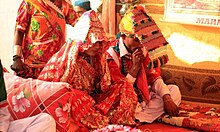In Pakistan, there are two laws governing Hindu marriages. One is the Sindh Hindu Marriage Act of 2016 which is applicable in the Sindh province of Pakistan and another is the Hindu Marriage Act of 2017 which is applicable in Islamabad Capital Territory, Balochistan, Khyber-Pakhtunkhwa and Punjab provinces. However, there are no laws and amendments made to register a marriage between two Hindus- one from Sindh and another from a different Province (Islamabad Capital Territory, Balochistan, Khyber-Pakhtunkhwa and Punjab).[1] Most of its articles are borrowed from Hindu Marriage Act, 1955 of British India, which was passed by British Raj.

Sindh Hindu Marriage Act of 2016
editIt is the first Hindu Marriage Act in Pakistan. It is applicable for Hindus living in the Sindh province. The Sikhs and Zorastrians can also register their marriage under this act.[2][1]
The Hindu Marriage Bill 2016 was moved by Sindh Parliamentary Affairs Minister Nisar Ahmed Khuhro.[3] In February 2016, the Provincial Assembly of Sindh passed the bill. As per this act any Hindu male and female above 18 can register their marriage.[2]
In 2018, the act was amended to add divorce and remarriage rights for couples and financial security of the wife and children after divorce.[4] The amendment was proposed by Pakistan Muslim League-Functional (PML-F) assembly member Nand Kumar Goklani.[5]
In 2018, the first inter-caste Hindu marriage was registered under the Sindh Hindu Marriage Act in Mirpurkhas District.[6]
Hindu Marriage Act of 2017
editIt is the first federal level personal law for Hindus.[7] It is applicable to the Hindus living in Islamabad Capital Territory, Balochistan, Khyber-Pakhtunkhwa and Punjab provinces.[1] The Hindu Marriage Bill was moved by Human Rights Minister Kamran Michael in 2016. It was unanimously passed by the National Assembly of Pakistan in 2016.[8][9] In 2017, the Senate of Pakistan passed the bill.[10] In March 2017, the Pakistani President Mamnoon Hussain signed the Hindu Marriage Bill and thereby making it a law.[11] The bill paves the way for regulations on registration of marriages and divorce for Hindus and fixes the minimum marrying age for males and females at 18 years-old.[12]
See also
editReferences
edit- ^ a b c Shahid Jatoi (8 June 2017). "Sindh Hindu Marriage Act—relief or restraint?". Express Tribune. Retrieved 10 November 2020.
- ^ a b "Sindh Assembly approves Hindu Marriage Bill". Dawn. 15 February 2016. Retrieved 10 November 2020.
- ^ Hafeez Tunio (15 February 2016). "Sindh Assembly becomes first in Pakistan to pass Hindu marriage bill". Express Tribune. Retrieved 10 November 2020.
- ^ "Pak's Sindh to let divorced or widowed Hindu women remarry". Times of India. 11 August 2018. Retrieved 10 November 2020.
- ^ "In its last session, Sindh Assembly grants Hindu widows right to remarry". Express Tribune. 26 May 2018. Retrieved 11 November 2020.
- ^ Zulfiqar Kunbhar (6 September 2018). "First inter-caste Hindu marriage takes place in Sindh". Daily Times. Retrieved 10 November 2020.
- ^ "Pakistan Senate passes landmark Hindu marriage bill". The Hindu. 18 February 2017. Retrieved 10 November 2020.
- ^ Kalbe Ali (27 September 2016). "NA finally passes Hindu marriage bill". Dawn. Retrieved 10 November 2020.
- ^ "Pakistani lawmakers adopt landmark Hindu marriage bill". Times of India. Press Trust of India. 27 September 2016. Retrieved 10 November 2020.
- ^ Yudhvir Rana (19 February 2017). "Pak senate's nod to Hindu Marriage Bill". Times of India. Retrieved 10 November 2020.
- ^ "Hindu Marriage Bill Becomes Law in Pakistan". News18. 20 March 2017. Retrieved 10 November 2020.
- ^ "Pakistan approves Hindu Marriage Bill after decades of inaction". Times of India. Press Trust of India. 9 February 2016. Retrieved 10 November 2020.